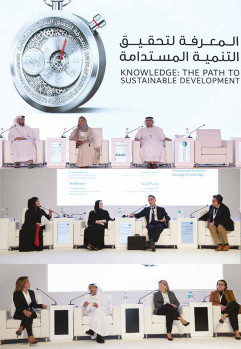Dubai: A Sustainable Global City
The first day of the 2019 Knowledge Summit witnessed a number of sessions on space and sustainability, Dubai’s experience as a sustainable global city, the role of women in leadership and participation, the future of the world’s cities, and how to build healthy and prosperous societies.
Using space as a tool to build a just, peaceful and sustainable world was the central theme of the panel discussion titled “Space and Sustainability”. The session was held on the opening day of the 6th Knowledge Summit and focused on how knowledge and innovation pave the way to create an environmentally friendly infrastructure. It also discussed Dubai’s position as a global centre for clean energy and a green economy, how technology can change the way we live, work and interact in our city and leave positive environmental impacts on a national, regional and global scale, along with sustainable development in Dubai, the role of government and the power of communication in achieving a sustainable economy.
The panel discussion brought together H.E. Dr Mohammed Nasser Al Ahbabi, Director General of the UAE Space Agency; Simonetta Di Pippo, Director of the United Nations Office for Outer Space Affairs; and Anne Hale Miglarese, CEO of Radiant Earth Foundation. The discussion was moderated by Ramia Farrage, a presenter and news editor at DMI.
The investments of UAE amount
to 20 billion dirhams to advance
all operations of space sector,
from research, studies, capacity
building and legislation.
Commenting on the intersection of innovative technologies and space data, Di Pippo emphasised the use of space research for commercial purposes. “Nations need to share data more openly and increase capacity to make data accessible to everyone and ensure research is beneficial to everyone,” she stated.
In h is p resentation, D r A l A hbabi g ave a n overview of the UAE’s space programme and stated the importance of collaboration between nations in space research. He spoke about the UAE’s ongoing research in the field and its role as a leading player in the space sector in the Arab region. He also highlighted the investments by UAE amounting to 20 billion Dirhams to advance all operations of this sector, from research, studies, capacity building and legislation.
Sustainable Dubai
Yousuf Lootah, Executive Director of Development and Investments at Dubai Tourism and Commerce Marketing (DTCM) and Khalid Sharif Alawadi, CEO, Environment, Health and Safety Sector at Dubai Municipality told the audience how creativity, innovation and working together is key in ensuring Dubai leads the way in sustainability.
In a session titled “Women on the Frontline and their Role in Empowering Other Women and Young Girls”, women were challenged to believe in themselves, not be afraid to ask for help, and communicate their needs.
Hjayceelyn Quintana, Philippine Ambassador to the UAE, hailed the Emirates for leading the way in women’s representation, with half of the Federal National Council made up of women.
Dr Mouza Al-Shehhi, Executive Director of the UN Women Liaison Office for the GCC, said there was a need for more women in peacekeeping despite it being a non-traditional career path for them.
Smart and vertical cities form
a realistic picture of the future
of the upcoming architectural
system.
H.H. Sheikha Jawaher Khalifa Al Khalifa, Chairperson of the Sheikha Jawaher Al Khalifa Foundation for Youth Empowerment, asserted that her mother “always gave her the chance to make her own decisions – to choose her own path.”
For her part, Aziza Osman, a Social Impact Entrepreneur and Consultant, said women’s empowerment was a topic close to her heart. She said women were often reluctant to apply for roles because they were missing a single requirement, whereas men didn’t see that as a problem.
Vertical cities
It has been reported that 90% of the world’s largest cities are threatened by rising sea levels. These environment catastrophes are the premise for Luca Curci’s unique proposal for a vertical city. It seems that smart and vertical cities form a realistic picture of the future of the upcoming architectural system. The Italian architect presented the concept of integrated, self-sustainable towers on water.
“We propose a vertical city built on water, which can house 25,000 people. The city will have a zerowaste policy and use renewable resources such as solar panels, wind and water turbines to produce energy. The city also includes integrated food production and farming, thereby offering a healthier lifestyle connected with elements of nature,” Curci stated.
Building good health is everyone’s responsibility, said His Excellency Humaid Al Qutami, Director General of the Dubai Health Authority (DHA). Delivering a keynote speech at a panel titled “Building Good Health and Prosperous Societies through Knowledge”, Al Qutami stated that the DHA’s approach to building a healthy, happy society is based on technology and partnership.
Dr Hajime Inoue, Director General of the Bureau of Planning and Administration at NCGM in Japan, John Nosta, President of Nosta Labs, and Dr Asma Al Mannaei, Director of Healthcare Quality Division at Abu Dhabi Department of Health ( HAAD), w ere a lso speakers on this panel.








